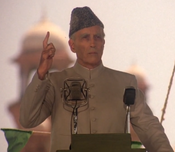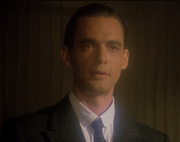
Muhammad Ali Jinnah (25 December 1876 – 11 September 1948) was Governor-General of Pakistan from 14 August 1947 to 11 September 1948, preceding Khawaja Nazimuddin. Jinnah was a longtime Indian National Congress and All-India Muslim League leader, and he would come to disagree with the Congress party as it became more Hindu-oriented. Jinnah would come to lead the Muslim League, advocating for the creation of an independent Muslim state that was separate from both Britain and India. Jinnah's independence movement succeeded, and he served as the leader of a semi-independent Pakistan from 1947 until his 1948 death, having presided over the independence of Pakistan and the start of a war with India. He became known as Quaid-i-Azam, meaning "Great Leader", and he was considered to be the father of Pakistan.
Biography[]
Early life[]

Jinnah in 1916
Muhammad Ali Jinnah was born as Mahomedali Jinnahbhai in Karachi, Bombay Presidency, British Raj (now in Sindh, Pakistan) on 25 December 1876 to a family of Shia Muslim Gujaratis who used to be a Hindu's that centuries earlier. His father Jinnahbhai Poonja was a prosperous merchant. He was the brother of Fatima Jinnah, who would remain unmarried as she worked as her brother's closest confidant and political ally. Before Jinnah left for Britain, his mother asked him to marry his first cousin Emibai Jinnah which he complied to. In 1892, Sir Frederick Leigh Croft, a business associate of Jinnahbhai Poonja, offered young Jinnah a London apprenticeship with his firm, Graham's Shipping and Trading Company. He accepted the position even though his mother disapproved of this. When Jinnah arrived in Britain, he gave up business apprenticeship so that he could study law which enraged his father, who had, before his departure, given him enough money to live for three years. While staying in Britain, both Jinnah's mother and wife died. Jinnah trained as a lawyer at Lincoln's Inn in London, England and enrolled at the Bombay High Court on his return to India, opening a legal practice. Jinnah would become politically-involved with the Indian National Congress party during the first two decades of the 20th century, and he led a protest at a British Army recruitment office in 1916 with the goal of forcing the British to accept Indian soldiers as commissioned officers. That same year, Jinnah met Rattanbai Petit, the sixteen-year-old daughter of Parsi businessman Dinshaw Petit, and the two fell in love. In 1918, Petit converted to Islam and married Jinnah, and she cut off contact with her family.
Split from the INC[]

Jinnah in 1920
Jinnah initially advocated for Hindu-Muslim unity during his political career, and he arranged for the INC and the All-India Muslim League to reconcile in the 1916 Lucknow Pact; he became a prominent Muslim League leader as well. Jinnah devised a fourteen-point constitutional reform plan for a self-governing India that would safeguard the political rights of the Muslim minority of India, and he began to focus more on Muslim rights as the INC became more Hindu-oriented. In 1920, he finally lashed out against INC leader Mahatma Gandhi when he denounced his nonviolent resistance campaign of satyagraha and claimed that the INC's use of Hindu religious symbols led to Muslims being exluded; he also claimed that this was tearing the INC apart, and that Gandhi needed to halt his pro-independence campaigns "before it (was) too late." Jinnah resigned from the Congress that same year, joining the Muslim League.
Exile in Britain[]

A middle-aged Jinnah
Jinnah found himself torn between his careers as a politician and lawyer and his personal life as a husband and father, and he ultimately decided on continuing with his political ambitions. In September 1922, his wife and his daughter Dina left him, and she became separated from Jinnah in 1927; she died of cancer two years later. Jinnah would settle in England with his daughter, and he sought medical care for persistent lung problems, which would eventually lead to his death. Jinnah disowned his daughter when she decided to marry the Parsi businessman Neville Wadia, despite the fact that he himself had married a Parsi; the difference was that his wife converted to Islam but Neville would not convert.
Birth of Pakistan[]

Jinnah holding up the declaration of independence, 1947
Jinnah was later persuaded to return to India by the poet Muhammad Iqbal, and he took charge of the "Pakistan movement". From 22–24 March 1940, he held a Muslim League party conference, during which he assured his supporters that independence was coming soon. During World War II, the Muslim League gained strength as many INC leaders were imprisoned for civil disobedience, and the party won most of the reserved Muslim seats in the postwar elections. Jinnah supported the creation of Pakistan, a constitutional Islamic republic, in the years following the war, fearing that the Muslims would be persecuted by the Hindu majority if they remained in India.
Governor-General[]

Jinnah in 1947
In August 1947, Jinnah was made Governor-General of Pakistan after Pakistan was granted its independence by the United Kingdom, and his Muslim League party dominated Pakistani politics. Jinnah was nearly assassinated by Indian Islamist radicals at a party conference, with the would-be assassin claiming that the assassination was revenge for Jinnah's granting of rights to women and Christians. Jinnah would also face other political issues, such as Pashtun nationalism and massacres of Indian Muslim refugees by Hindu and Sikh mobs as they fled to Pakistan. Jinnah personally supervised the construction of refugee camps to house the millions of Indian Muslim refugees who had fled to Pakistan. Jinnah, named Quaid-e-Azam of Pakistan, sought to make Pakistan a sanctuary for Indian Muslims, and he sent Pakistani irregulars into Kashmir in October 1947 to assist the locals in rebelling against Indian rule. Jinnah did not live to see the end of the war, as he fell ill at his Ziarat reterat in Quetta. He was airlifted to the Karachi Airport, but his ambulance was caught in a traffic jam on the way to the Governor House, and he died in a state of confusion.
